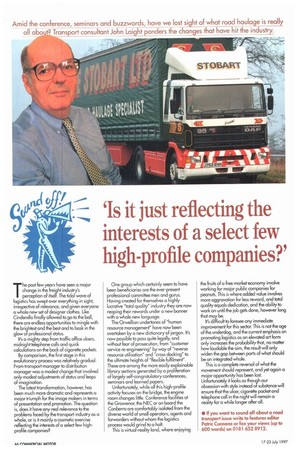'Is it just reflecting the interests of a select few high-profile companies?'
Page 58

If you've noticed an error in this article please click here to report it so we can fix it.
The past few years have seen a major change in the freight industry's perception of itself. The tidal wave of logistics has swept over everything in sight, irrespective of relevance, and given everyone a whole new set of designer clothes. Like Cinderella finally allowed to go to the ball, there are endless opportunities to mingle with the brightest and the best and to bask in the glow of professional status,
It's a mighty step from traffic office ulcers, midnight telephone calls and quick calculations on the back of cigarette packets. By comparison, the first stage in this evolutionary process was relatively gradual. From transport manager to distribution manager was a modest change that involved only modest adjustments of status and leaps of imagination. The latest transformation, however, has been much more dramatic and represents a major triumph for the image makers in terms of presentation and promotion. The question is, does it have any real relevance to the problems faced by the transport industry as a whole, or is it mainly a cosmetic exercise reflecting the interests of a select few highprofile companies? One group which certainly seem to have been beneficiaries are the ever-present professional committee men and gurus. Haying created for themselves a highly lucrative "total quality" industry they are now reaping their rewards under a new banner with a whole new language. The Orwellian undertones of "human resource management" have now been overtaken by a new dictionary of jargon. It's now possible to pass quite legally, and without fear of prosecution, from "customer service re-engineering" by way of "reverse resource utilisation" and "cross docking" to the ultimate heights of "flexible fulfilment". These are among the more easily explainable library sections generated by a proliferation of largely self-congratulatory conferences, seminars and learned papers. Unfortunately, while all this high-profile activity focuses on the bridge, the engine room changes little. Conference facilities at the Grosvenor, the NEC or on board the Canberra are comfortably isolated from the diverse world of small operators, agents and forwarders without whom the logistics process would grind to a halt. This is virtual-reality land, where enjoying the fruits of a free market economy involve working for major public companies for peanuts. This is where added value involves more aggravation for less reward, and total quality equals dedication, and the ability to work on until the job gets done, however long that may be. It's difficult to foresee any immediate improvement for this sector. This is not the age of the underdog, and the current emphasis on promoting logistics as an elevated art form only increases the probability that, no matter how laudable the aim, the result will only widen the gap between parts of what should be an integrated whole. This is a complete reversal of what the movement should represent, and yet again a major opportunity has been lost. Unfortunately it looks as though our obsession with style instead of substance will ensure that the ulcer, cigarette packet and telephone call in the night will remain a reality for a while longer after all.




















































































































